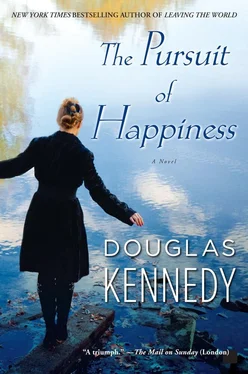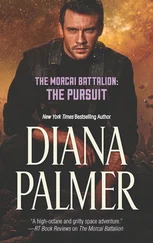'But it's not summa cum laude, like me', Eric said, his eyebrows arching mischievously.
'Thanks a lot', I said.
'Anytime, S'.
'You have both done us proud', Mother said.
'Academically speaking', Father added.
'Yes', Mother said quickly, 'academically speaking, we couldn't be prouder parents'.
That was the last time we were ever together as a family. Six weeks later - returning home to the Barbizon Hotel for Women after a long day at Life - I was stunned to see Eric standing in the lobby. His face was chalky, drawn. He looked at me with trepidation - and I knew immediately that he had something terrible to tell me.
'Hi, S', he said quietly, taking my hands in his.
'What's happened?'
'Father died this morning'.
I heard my heart pound against my ribcage. For a moment or two I really didn't know where I was. Then I felt my brother's steadying hands on my arms. He led me to a sofa, and helped me down into it, sitting next to me.
'How?' I finally said.
'A heart attack - at his office. His secretary found him slumped over his desk. It must have been pretty instantaneous... which is a blessing, I guess'.
'Who told Mother?'
'The police. And then the Daniels called me. They said Mom's pretty distraught'.
'Of course she's distraught', I heard myself saying. 'He was her life'.
I felt a sob rise up in my throat. But I stifled it. Because I suddenly heard Father's voice in my head: ' Crying is never an answer', he once told me when I burst into tears after getting a C+ in Latin. 'Crying is self-pity. And self-pity solves nothing'.
Anyway, I didn't know what to feel at this moment - except the jumbled anguish of loss. I loved Father. I feared Father. I craved his affection. I never truly felt his affection. Yet I also knew that Eric and I meant everything to him. He just didn't know how to articulate such things. Now he never would. That was the realization which hit me hardest - the fact that, now, there would never be a chance for us to breach the gulf that was always between us; that my memory of Father would always be colored by the knowledge that we never really talked. I think that is the hardest thing about bereavement - coming to terms with what might have been, if only you'd been able to get it right.
I let Eric take charge of everything. He helped me pack a bag. He got us both into a cab to Penn Station, and on the 8.13 to Hartford. We sat in the bar car, and drank steadily as the train headed north through Fairfield County. Never once did he seem stricken by grief - because, I sensed, he wanted to remain strong for me. What was so curious about our conversation was how little we talked about Father, or Mother. Instead we chatted idly - about my work at Life, and Eric's Theater Guild job, and rumors emanating from Eastern Europe about Nazi-run death camps, and whether Roosevelt would keep Henry Wallace as his Vice-President during next year's Presidential campaign, and why Lillian Hellman's Watch on the Rhine was (in Eric's unrestrained opinion) a truly terrible play. It was as if we couldn't yet bring ourselves to deal with the profundity of losing a parent - especially one about which we both had such complex, ambivalent feelings. Only once during that journey was the matter of family mentioned... when Eric said, 'Well, I guess you can move out of the Barbizon now'.
'Won't Mother object?' I asked.
'Believe me, S - Mother will have other things on her mind'.
How dreadfully accurate Eric turned out to be. Mother wasn't simply grief-stricken by Father's death; she was inconsolable. During the three days before the funeral, she was so despondent that the family doctor kept her under sedation. She got through the actual service at the local Episcopal church, but came completely unstuck at the graveside. So unstuck that the doctor recommended admitting her to a rest home for observation.
She never left that rest home again. Within a week of her admission, a form of premature senile dementia had set in - and we lost her completely. A variety of specialists examined her - and they all came to the same conclusion: in the wake of Father's death, her grief had been so intense, so overwhelming, that she suffered a stroke which gradually attacked her speech, her memory, her motor control. For the first few months of her illness, Eric and I traveled back together every weekend to Hartford, to sit by her bed and hope for some sign of cognitive life. After six months, the doctors told us that it was unlikely that she would ever emerge from her dementia. That weekend we made some difficult, but necessary decisions. We put the family home on the market. We arranged for all of our parents' possessions to be sold, or given away to charity. Neither of us took much from the family home. Eric laid claim to a small writing table which Father kept in his bedroom. I held on to a photo, taken in 1913, of my parents on their honeymoon in the Berkshires. Mother was seated in a stiff-backed chair, wearing a long-sleeved white linen dress, her hair gathered up into a tightly constricted bun. Father was standing by her. He was in a dark cutaway suit, with a vest and a stiff high-collar. His left hand was behind his back, his right hand on Mother's shoulder. There was no glimmer of affection between them; no sense of ardour, or romantic animation, or even the simple pleasure of being in each other's company. They looked so stiff, so formal, so unsuited to the century in which they found themselves.
On the night Eric and I were sorting through their possessions - and we came upon this photograph in the attic - my brother burst into tears. It was the only time I ever saw him cry since Father had died and Mother took ill (whereas I had been regularly locking myself in the Ladies' room at Life, and blubbering like a fool). I knew exactly why Eric had suddenly broken down. Because that photograph was the perfect portrait of the formal, constrained face that our parents presented to the world... and, more tellingly, to their children. We always thought that their austerity extended to each other - because there were never any public displays of affection between them. But now we realized that there was this hidden passion between them - a love and a dependency so profound that it killed Mother to be without Father. What astonished us both was that we never saw this passion, never detected it for a moment.
'You never really know anybody', Eric said to me that night. 'You think you do - but they always end up baffling you. Especially when it comes to love. The heart is the most secretive - and confounding - part of the anatomy'.
My one antidote at this time was my job. I loved working at Life. Especially since, within four months, I had graduated from trainee status to the post of junior staff writer. I was researching and writing at least two short articles for the magazine every week. I was assigned the stories by a senior editor - a chain-smoking old-school journalist named Leland McGuire, who used to be the City editor on the New York Daily Mirror, but had moved to Life for the money and the gentler hours, and really missed the rough-and-tumble of a big raucous daily newspaper. He took a shine to me - and, shortly after I joined his department, took me out to lunch at the Oyster Bar in the basement of Grand Central Station.
'You want a piece of professional advice?' he asked me after we worked our way through two cups of chowder and a dozen cherrystones.
'Absolutely, Mr McGuire'.
'Leland, please. Okay - here it is. If you really want to become a properly seasoned journalist, get the hell out of the Time and Life building and find a reporter's job at some big-deal daily. I'm sure I could help you there. Find you something at the Mirror or the News'.
'You're not happy with my work so far?'
'On the contrary - I think you're terrific. But face facts: Life is, first and foremost, a picture magazine. Our senior writers are all men - and they're the ones who get sent out to cover the big stuff: the London blitz, Guadalcanal, FDR's next campaign. All I can give you is the arts-and-craft stuff: little five-hundred-word pieces on this month's big new movie, or a new fashion craze, or cookery tips. Whereas if you went to the City desk of the Mirror, you'd probably find yourself out on the beat with the cops, covering the courts, maybe even getting a real juicy assignment like an execution at Sing-Sing'.
Читать дальше












